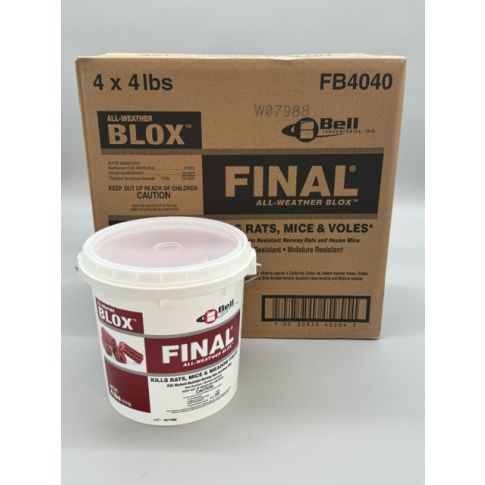Be the first to review this product
FINAL BLOX 4 x 4# (91 x 20 gm) PAILS/CS
Final All-Weather Blox contains the powerful active ingredient, Brodifacoum, our strongest, single-feeding anticoagulant. Final is effective in controlling both rats and mice but works especially well to clean out persistent mouse infestations.
Final All-Weather Blox, with its distinctive cog-like shape, is made with more than food-grade, inert ingredients for a flavor rats and mice can't resist. The bait of choice in the pest control industry, Bell's patented All-Weather Blox are manufactured from Bell's unique extrusion process that yields a hard, multiple-edged bait with the palatability of a meal bait and the weatherability of a paraffinized bait.
This highly weatherable block bait easily fits in tight baiting places. A hole in the center of this 20 gram Blox lets PMPs place it on bait securing rods in Bell's tamper-resistant bait stations, or nail or wire it in place. With Final Blox, you'll get excellent rodent acceptance and control. The multiple edges appeal to a rodent's desire to gnaw. Final Blox work well in any condition -- wet or dry, indoors or out. Ready-to-use Final All-Weather Blox complements Bell's outstanding line of rodent baits, offering PMPs another tool to control rats and mice.
| Size | 4 x 4# PAILS / CASE |
| Manufacturer | BELL LABS [view products, website] |
| EPA# | 12455-89 |
| Active Ingredient | Brodifacoum |
| Label | belfb4040_final_blox_label_06062019.pdf |
| SDS | belfb4040_final_blox_sds_06062019.pdf |
| Chemical Classes | Anticoagulant |
| Target Pests | Norway Rats, Roof Rats, House Mice, Meadow Voles |
| Use | Residential, commercial, or industrial buildings, indoors and outdoors. |
| Application | All rodenticides should be placed in a Bell Labs tamper-resistant bait station. RATS: Place 5 to 22 blocks (usually at intervals of 15 to 30 feet) per placement. MICE: Place 1 block per placement. Space placements at 8 to 12 foot intervals. Two blocks may be needed at points of very high mouse activity. |
| No Web orders to | AK, CA, HI, PR, SC, NON U S LOCATIONS |
| Coverage Area | All bait placements must be inside or within 50 feet of buildings. |
| Yield | Each 4 lb. pail contains approx. 88 x 20 gm blocks |
USE RESTRICTIONS:
Do not place bait in areas where there is a possibility of contaminating food or surfaces that come in direct contact with food. When used in USDA-inspected facilities, this product must be applied in tamper resistant bait stations. Do not broadcast bait.
TREATMENT AREAS:
Determine areas where rats or mice will most likely find and consume the bait. Generally, these areas are along walls, by gnawed openings, in or beside burrows, in corners and concealed places, between floors and walls, or in locations where rodents or their signs have been seen. Protect bait from rain and snow. Remove as much alternative food as possible.
USE DIRECTIONS:
RATS:
Place 5 to 22 blocks (usually at intervals of 15 to 30 feet) per placement. Maintain an uninterrupted supply of fresh bait for at least 10 days or until signs of rat activity cease.MICE:
Place 1 block per placement. Space placements at 8 to 12 foot intervals. Two blocks may be needed at points of very high mouse activity. Maintain an uninterrupted supply of fresh bait for at least 15 days or until signs of mouse activity cease.SEWER BAITING:
- Thread wire through block and securely attach to a stationary structure such as the bottom step of a manhole ladder or a sewer grate. Allow just enough wire for the block to rest on manhole underside.
- A Final Blox can also be suspend block a few inches above the high water mark or secure block on a board supported by opposing steps of the ladder. Securing block in this manner will prevent removal by rats or water.
- Use at least 15 blocks per manhole. Maintain an uninterrupted supply of fresh bait for at least 10 days or until signs of rat activity cease.
Replace contaminated or spoiled bait immediately. Collect and dispose of all dead, exposed animals and leftover bait. To prevent reinfestation, limit sources of rodent food, water, and harborage as much as possible. If reinfestation does occur, repeat treatment. Where a continuous source of infestation is present, establish permanent bait stations and replenish as needed.
Refer to the Product Label for additional baiting instructions and approved application sites.
USE RESTRICTIONS:
Do not place bait in areas where there is a possibility of contaminating food or surfaces that come in direct contact with food. When used in USDA-inspected facilities, this product must be applied in tamper resistant bait stations. Do not broadcast bait.
TREATMENT AREAS:
Determine areas where rats or mice will most likely find and consume the bait. Generally, these areas are along walls, by gnawed openings, in or beside burrows, in corners and concealed places, between floors and walls, or in locations where rodents or their signs have been seen. Protect bait from rain and snow. Remove as much alternative food as possible.
USE DIRECTIONS:
RATS:
Place 5 to 22 blocks (usually at intervals of 15 to 30 feet) per placement. Maintain an uninterrupted supply of fresh bait for at least 10 days or until signs of rat activity cease.MICE:
Place 1 block per placement. Space placements at 8 to 12 foot intervals. Two blocks may be needed at points of very high mouse activity. Maintain an uninterrupted supply of fresh bait for at least 15 days or until signs of mouse activity cease.SEWER BAITING:
- Thread wire through block and securely attach to a stationary structure such as the bottom step of a manhole ladder or a sewer grate. Allow just enough wire for the block to rest on manhole underside.
- A Final Blox can also be suspend block a few inches above the high water mark or secure block on a board supported by opposing steps of the ladder. Securing block in this manner will prevent removal by rats or water.
- Use at least 15 blocks per manhole. Maintain an uninterrupted supply of fresh bait for at least 10 days or until signs of rat activity cease.
Replace contaminated or spoiled bait immediately. Collect and dispose of all dead, exposed animals and leftover bait. To prevent reinfestation, limit sources of rodent food, water, and harborage as much as possible. If reinfestation does occur, repeat treatment. Where a continuous source of infestation is present, establish permanent bait stations and replenish as needed.
Refer to the Product Label for additional baiting instructions and approved application sites.

